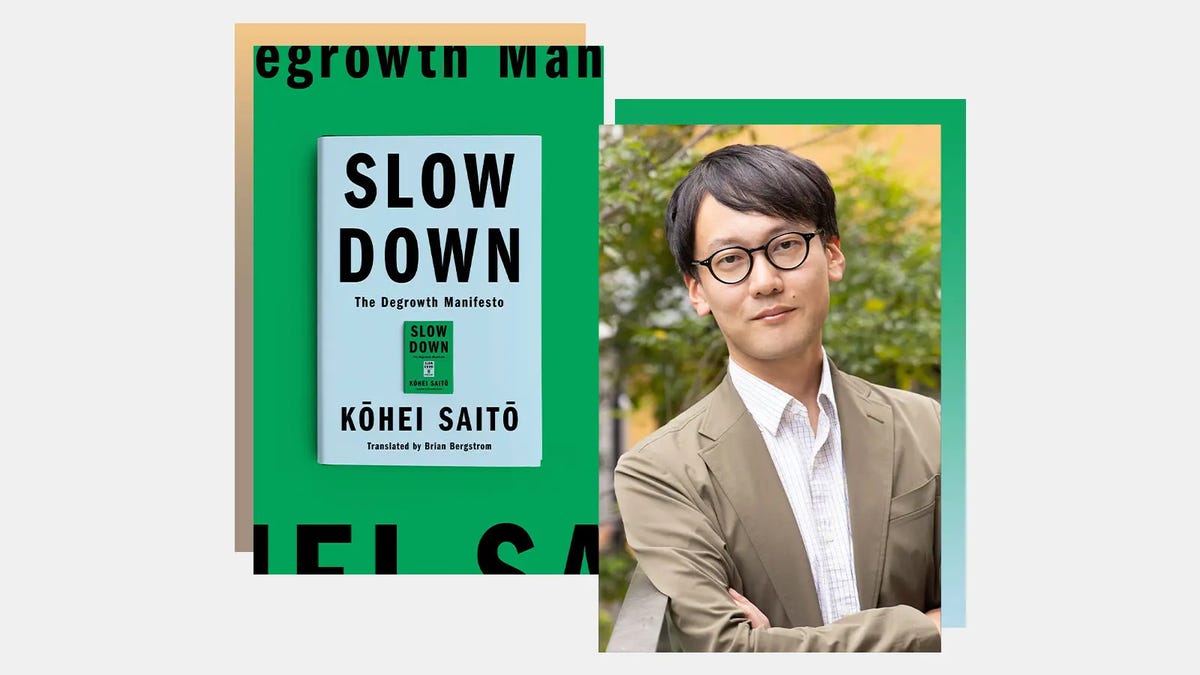This story was originally published by Grist. Sign up for Grist’s weekly newsletter here.
Imagine a world where you work three or four days a week. In your free time, you play sports, spend time with loved ones, garden, and engage with local politics. Overnight shipping, advertising, and private jets no longer exist, but healthcare, education, and clean electricity are free and available to all.
That’s the radical vision proposed by philosophy professor and Marxist scholar Kohei Saito. In 2020, as residents in Japan hunkered down during the early stages of the COVID-19 pandemic, Saito published a book that would eventually become a surprise bestseller, titled Capital in the Anthropocene. Relentless consumption and production, the drivers of economic growth, have fueled the climate crisis and global inequality, Saito argues in the book. He instead promotes degrowth — a deliberate shrinking of the economy — as a way to redistribute resources and shift to a slower economic system that prioritizes human welfare and planetary well-being.
No one, not even Saito, could have predicted the response. His book sold more than 500,000 copies in Japan, has been translated into multiple languages, and garnered international media attention. Last month, a much-anticipated English translation, titled Slow Down: The Degrowth Manifesto, was released in the United States. “Even I thought my ideas were too radical to find much of an audience,” Saito writes in the introduction to the English edition. “Who would read a book on ‘degrowth communism’ written by a basically unknown scholar of political thought in the Marxist tradition?”
Yet Saito’s book has found readers across the world who want to listen. In Japan, when his book was initially released in 2020, decades of economic stagnation and neoliberal reform had crystallized into open frustration as the pandemic widened existing inequalities. For some, the COVID crisis shed light on how policies oriented around economic growth had failed to prevent either the pandemic or rising greenhouse gas emissions.
Meanwhile, in the U.S. and other wealthy countries, climate advocates are increasingly debating whether countries should deprioritize economic growth to slow global warming. On one hand, building out renewable energy and clean technologies will necessarily lead to new jobs and more economic activity. Developing countries also need to grow their economies to raise standards of living. But degrowth advocates, including Saito and economists like Jason Hickel and Tim Jackson, say that simply swapping in clean energy for fossil fuels isn’t enough. They argue that high-income countries, responsible for the lion’s share of global greenhouse gas emissions, should also reduce energy use and resource extraction from developing nations, while focusing on providing the basics — such as food, clean water, shelter, and energy — to residents at no cost.
Grist sat down with Saito to discuss why his anti-capitalist messages have struck a chord with readers and what degrowth might look like in practice. This conversation has been condensed and edited for clarity.
Q. Why do you think we’re seeing a growing interest in critiquing capitalism, and degrowth in general?
A. Looking at previous decades, neoliberal reforms really destabilized our society all over the world. And there are a lot of discussions about how we can solve the climate crisis, and how we can solve economic inequality. But these measures are not properly working, and the climate crisis has been accelerating. People are suffering from precarious jobs, low wages, and a lot of competition. And people are indeed unhappy.
Degrowth and the idea of post-capitalism are of course in some sense utopian at the moment. But at the same time, people who are really looking for an alternative — people who really care about the crisis — can’t find the answer within the existing framework. I don’t claim that my answer is definitive and comprehensive, but it resonates with the general atmosphere of dissatisfaction and discontent, especially among younger generations.
Q. I want to dig into your critiques of capitalism as laid out in Slow Down. Could you talk about why you think capitalism drives global inequality and climate change?
A. Karl Marx famously demonstrated that capitalism has the tendency to enlarge economic inequality because capitalism exploits workers so that the capital is accumulated in the hands of the few. And Marx also said that in such a system where people are exploited, nature is also exploited. We didn’t really recognize this tendency for many years because affluent countries, like the U.S., Japan, and the E.U., were able to externalize a lot of costs to somewhere else.
That means that our affluent lives are often supported by cheap products and cheap resources based on the exploitation of nature and humans in the Global South.
Capitalism has subsumed the entire planet now because of globalization. That means we externalized all the costs. Now, we don’t have any more space to externalize because China is expanding, Brazil is expanding, India is expanding: Everyone tries to be a capitalist and it doesn’t work anymore. We are encountering the global ecological crisis, the pandemic, the climate crisis, competition for resources — and these things are closely related to capitalism and the tendency to constantly expand.
Q. Many climate policies today, like Green New Deal proposals, are focused on expanding renewable energy and clean technology, while creating new jobs and continuing to grow the economy. In your view, why are these measures insufficient for tackling the climate crisis?
A. First of all, I’m not against technology. We need renewable energy. We need electric vehicles and so on. I’m for inventing new technologies and investing more in developing cheaper, sustainable energy. I’m not an advocate of “going back to nature.”
The problem is that when we try to grow, we sell more products and bigger products. The most representative case is SUVs. Even if we transition to electric vehicles, if we keep building bigger cars, we still use a lot of energy and resources that come mainly from the Global South. So there will be a continuation of the robbing of land and resources, exploitation of mining workers and the destruction of Indigenous life, deforestation, and so on.
I think what’s necessary is: Invest in those green technologies. But at the same time, we should start talking about the need to reduce the number of cars, for example, or industrial meat consumption, or frequency of flying. Maybe we should ban private jets. Maybe we should ban domestic short-distance flights because we can take trains. These things must be also prioritized.
The problem with the existing mainstream green capitalism discourse is they never talk about reducing our excessive consumption and production, because that’s not something capitalism can accept. For everyone to live a decent life on this planet, the Global North needs to give up what is unnecessary. That’s not something capitalism can do.
Q. In response, you’re promoting an alternative economic vision of degrowth communism. How could this better achieve global climate goals?
A. Degrowth is about abandoning GDP [gross domestic product] as the single measure of our progress. Degrowth is also about reducing what is unnecessary.
GDP can be increased by producing what is unnecessary, like private jets. I’m saying, OK, maybe we don’t need these things because that’s only for rich people, and that’s also destroying the planet. So why don’t we spend money and energy on something that is more sustainable and that everyone needs? For example, free internet, free public transportation, free education, free medical care. These things that are mostly commodified, especially in the U.S., must be de-commodified.
Our current model is that when the economy grows, the pie becomes bigger, so everyone will have a bigger share. But in this process of making the economy bigger, we produce so many unnecessary things. Once we make a transition to a degrowth society, the pie of the economy won’t grow bigger anymore. That means that we need to share existing wealth.
Of course, there are things we cannot share, like private property. But for example, we could share knowledge and education, public transportation, culture, communal farming, electricity, and so on. That means that we can be happier, have more access to essential goods and services, and live a more stable life.
We will not have a new iPhone every two years. We will not have fast fashion. We will not have industrial meat production. We might not have something like McDonald’s, but we will have more healthy meals. We will have more sustainable clothing that you can wear for many years. You might give up something, but at the same time, you gain social stability, community, and better products.
Q. Some people have raised concerns that slowing economic growth would hurt countries that are still developing. What would degrowth mean for the Global South?
A. I’m not saying that the Global South should immediately accept the principles of degrowth. We need to build more roads, buildings, schools, and hospitals. We also need to make more power plants and solar panels.
But I think even when they grow, they should place more importance on satisfying basic needs rather than making things more profitable and competitive, which is how development has been imposed by the World Bank through structural adjustment programs [conditions on loans from the International Monetary Fund and the World Bank that require developing countries to encourage privatization and free trade]. We need different models of development in the Global South.
There will be, of course, more usage of resources and energy in countries in the Global South, because right now they are under-consuming. Their development necessarily involves more consumption of energy and resources. That creates some pressure on planetary boundaries. So that means that the Global North needs to consciously degrow because it is over-developing, and has excessive production and consumption.
Q. You write in the book about how a degrowth transition doesn’t have to happen all at once, and that in fact, it’s already happening. Could you talk about a few examples you see today that represent a step toward degrowth?
A. France has banned short-distance domestic flights — that is one important step. Some European societies are now experimenting with shorter working hours, like a four-day workweek. Free education and free medical care are other examples. We should expand these to free internet, which is something [former U.K. Labour Party leader] Jeremy Corbyn put forward during his electoral campaign a couple years ago.
We should also introduce maximum limits on annual incomes, worker cooperatives, and social ownership of companies, including water companies and electricity companies. These are some of the basic countermeasures that we can introduce within capitalism.
Q. Some say degrowth is too politically challenging, and that asking people in the Global North to, for example, cut down their consumption would be quite unpopular. What would it take to achieve such a widespread shift in priorities on a political level? Is pursuing degrowth realistic?
A. I think it’s in some sense utopian. But believing that capitalism will prosper in the decades to come is utopian too, because we will have more natural disasters, inflation, wars — and these will all accelerate with the climate crisis. So it’s naive to think that our way of life will somehow continue.
I think more people, especially among the younger generation, are demanding a more radical change. Fifteen years ago, I don’t imagine movements like Sunrise Movement, Fridays for Future, Extinction Rebellion, and Just Stop Oil would get support from society or enough media attention. But I think our perception is radically changing, and people like Greta Thunberg really shifted our discussion to another level. The reevaluation of values can take place actually quite rapidly.
What I’m trying to do is present new values and principles of a more democratic and sustainable society. If people read my book and find some of the proposals attractive, their perception of the world is starting to change. And I think this accumulation of change can have a very significant impact over time.
This article originally appeared in Grist at https://grist.org/economics/slow-down-do-less-a-qa-with-the-author-who-introduced-degrowth-to-a-mass-audience/. Grist is a nonprofit, independent media organization dedicated to telling stories of climate solutions and a just future. Learn more at Grist.org
#Banning #Private #Jets #4Day #Work #Week #Radicaland #Popular













